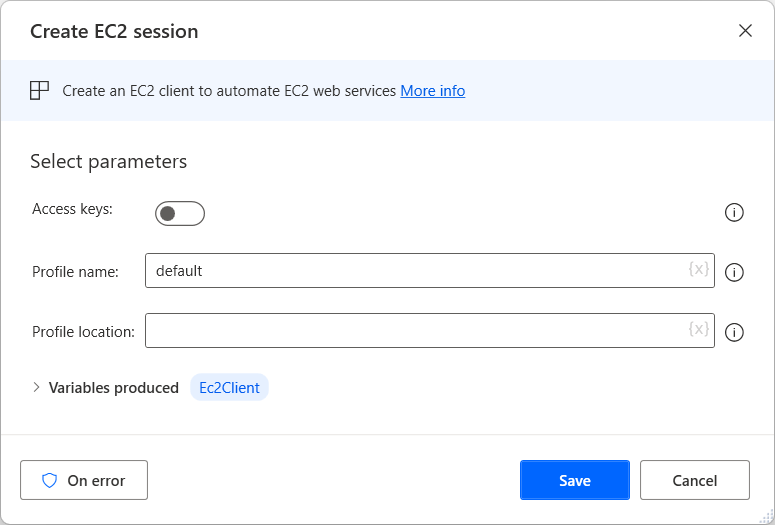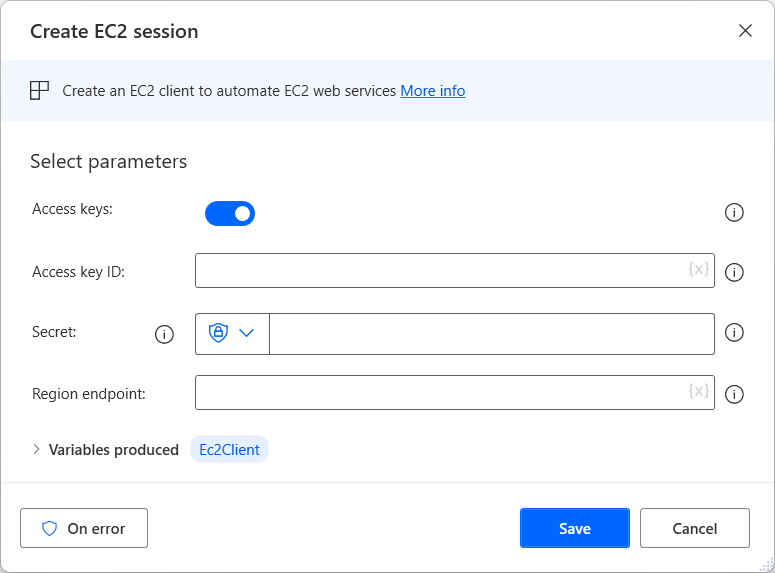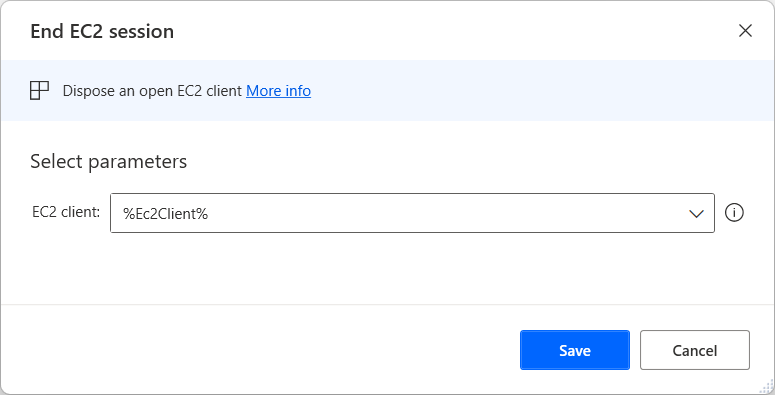AWS actions
Article 12/16/2022
6 contributors
Feedback
In this article
Important
You need an active AWS subscription to deploy AWS actions in your desktop flows.
Power Automate enables users to handle EC2 instances, volumes, and snapshots through the AWS group of actions.
Before deploying any AWS action, create a new EC2 session using the Create EC2 session action.
To use a credentials file for authentication, disable Access keys and populate Profile name and Profile location . If you don't want to reference a profile name explicitly, choose default in Profile name to use the default profile.
Alternatively, enable Access keys and populate the access key ID, the secret access key, and the region constraint specifying the endpoint.
After creating the session and deploying all the needed AWS actions, use the End EC2 session action to terminate the EC2 session.
Start EC2 instance
Start EC2 instance(s).
Argument
Optional
Accepts
Default Value
Description
EC2 client
No
EC2 client The EC2 client
Instance IDs
No
List of Text values The instance IDs to start
Variables produced
Exceptions
Exception
Description
Authentication failed
Indicates that the provided credentials couldn't be validated
Unauthorized operation
Indicates that an unauthorized operation was requested
Invalid instance ID
Indicates that either the specified instance ID is malformed, or that the specified instance doesn't exist
Insufficient capacity
Indicates that there isn't enough capacity to fulfill the request
Amazon service request failed
Indicates that the request to AWS failed
Stop EC2 instance
Stop EC2 instance(s).
Argument
Optional
Accepts
Default Value
Description
EC2 client
No
EC2 client The EC2 client
Instance IDs
No
List of Text values The instance IDs to stop
Force stop
N/A
Boolean value False
Specifies whether to force the instances to stop. The instances don't have an opportunity to flush file system caches or file system metadata
Hibernation:
N/A
Boolean value False
Specifies whether to hibernate the instance, if it was enabled for hibernation at launch. If the instance can't hibernate successfully, a normal shutdown occurs
Variables produced
Exceptions
Exception
Description
Authentication failed
Indicates that the provided credentials couldn't be validated
Unauthorized operation
Indicates that an unauthorized operation was requested
Unsupported operation
Indicates that an unsupported operation was requested. For example, an instance that is instance store-backed can't be stopped
Invalid instance ID
Indicates that either the specified instance ID is malformed, or that the specified instance doesn't exist
Amazon service request failed
Indicates that the request to AWS failed
Reboot EC2 instance
Reboot EC2 instance(s).
Argument
Optional
Accepts
Default Value
Description
EC2 client
No
EC2 client The EC2 client
Instance IDs
No
List of Text values The instance IDs to reboot
Variables produced
This action doesn't produce any variables.
Exceptions
Exception
Description
Authentication failed
Indicates that the provided credentials couldn't be validated
Unauthorized operation
Indicates that an unauthorized operation was requested
Unsupported operation
Indicates that an unsupported operation was requested. For example, an instance that is instance store-backed can't be stopped
Invalid instance ID
Indicates that either the specified instance ID is malformed, or that the specified instance doesn't exist
Incorrect state for the request
Indicates that the resource is in an incorrect state for the request. This exception can occur if there's an attempt to attach a volume that is still being created (ensure that the volume is 'available') or detach a volume that isn't attached
Amazon service request failed
Indicates that the request to AWS failed
Get available EC2 instances
Get information for the relevant EC2 instances.
Argument
Optional
Accepts
Default Value
Description
EC2 client
No
EC2 client The EC2 client
Availability zone
Yes
Text value Specifies the availability zone, a region code followed by a letter identifier
Instance state
N/A
Pending, All, Unknown, Running, Shutting down, Terminated, Stopping, Stopped
All
The state of the instance (pending, running, shutting down, terminated, stopping, stopped)
Variables produced
Exceptions
Exception
Description
Authentication failed
Indicates that the provided credentials couldn't be validated
Unauthorized operation
Indicates that an unauthorized operation was requested
Amazon service request failed
Indicates that the request to AWS failed
Describe instances
Returns all the information for the specified EC2 instance(s).
Argument
Optional
Accepts
Default Value
Description
EC2 client
No
EC2 client The EC2 client
Instance IDs
Yes
List of Text values The instance IDs to describe
Availability zone
Yes
Text value Specifies the availability zone, a region code followed by a letter identifier
Instance state
N/A
Pending, All, Unknown, Running, Shutting down, Terminated, Stopping, Stopped
All
The current state of the instance
Variables produced
Argument
Type
Description
Ec2Instances
List of EC2 instances The retrieved instance(s) with all the relevant information
Exceptions
Exception
Description
Authentication failed
Indicates that the provided credentials couldn't be validated
Unauthorized operation
Indicates that an unauthorized operation was requested
Invalid instance ID
Indicates that either the specified instance ID is malformed, or that the specified instance doesn't exist
Amazon service request failed
Indicates that the request to AWS failed
Create snapshot
Create a snapshot of an EBS volume and stores it in Amazon S3.
Argument
Optional
Accepts
Default Value
Description
EC2 client
No
EC2 client The EC2 client
Volume ID
No
Text value The ID of the EBS volume
Name
Yes
Text value The name of the snapshot
Description
Yes
Text value A description for the snapshot
Purpose
Yes
Text value The purpose of the snapshot
Variables produced
Argument
Type
Description
Snapshot
EBS snapshot The created snapshot
Exceptions
Exception
Description
Authentication failed
Indicates that the provided credentials couldn't be validated
Unauthorized operation
Indicates that an unauthorized operation was requested
Invalid volume
Indicates that either the volume ID isn't valid, or the specified volume doesn't exist
or the volume isn't in the same qvailability zone as the specified instance
Resource's limit is exceeded
Indicates that the limit for the specified resource is reached
Amazon service request failed
Indicates that the request to AWS failed
Describe snapshots
Describes the specified EBS snapshots available.
Argument
Optional
Accepts
Default Value
Description
EC2 client
No
EC2 client The EC2 client
Describe snapshots mode
N/A
All snapshots, Snapshots by ID, Snapshots by owner ID, Snapshots by restorable user ID, Snapshots by custom filter
All snapshots
Specifies whether to get all snapshots of the defined region or filter snapshots by their ID, owner, or user by which they're restorable
Snapshot IDs
Yes
List of Text values The snapshot IDs to describe
Owner IDs
Yes
List of Text values The owner IDs who own the snapshots
Restorable by user IDs
Yes
List of Text values The IDs of the AWS accounts that can create volumes from the snapshot
Variables produced
Argument
Type
Description
EBSSnapshots
List of EBS snapshots The retrieved snapshot(s) with all the relevant information
Exceptions
Exception
Description
Authentication failed
Indicates that the provided credentials couldn't be validated
Unauthorized operation
Indicates that an unauthorized operation was requested
Invalid snapshot ID
Indicates that either the specified snapshot ID is invalid, or that the specified snapshot doesn't exist
Invalid user ID
Indicates that the specified user or owner isn't valid
Amazon service request failed
Indicates that the request to AWS failed
Delete snapshot
Delete the specified snapshot.
Argument
Optional
Accepts
Default Value
Description
EC2 client
No
EC2 client The EC2 client
Snapshot ID
No
Text value The ID of the EBS snapshot to delete
Variables produced
This action doesn't produce any variables.
Exceptions
Exception
Description
Authentication failed
Indicates that the provided credentials couldn't be validated
Unauthorized operation
Indicates that an unauthorized operation was requested
Invalid snapshot ID
Indicates that either the specified snapshot ID is invalid, or that the specified snapshot doesn't exist
The resource is in use
Indicates that the operation can't be completed because the resource is in use
Amazon service request failed
Indicates that the request to AWS failed
Create volume
Create an EBS volume.
Argument
Optional
Accepts
Default Value
Description
EC2 client
No
EC2 client The EC2 client
Name
Yes
Text value The desired name for the volume
Purpose
Yes
Text value The purpose of the volume, if any
Availability zone
No
Text value Specifies the availability zone, a region code followed by a letter identifier
From snapshot
N/A
Boolean value False
Specifies whether to create the volume from a specified snapshot
Snapshot ID
No
Text value The snapshot from to create the volume from
Volume size
No
Text value The size of the volume in GBs
Size
Yes
Text value The size must be equal to or larger than the snapshot size
Encrypted
N/A
Boolean value False
Specifies whether to encrypt the volume
Volume type
N/A
Gp2, Standard, Io1, Sc1, St1
Gp2
The type of the volume
Variables produced
Argument
Type
Description
Volume
EBS volume The created volume
Exceptions
Exception
Description
Authentication failed
Indicates that the provided credentials couldn't be validated
Unauthorized operation
Indicates that an unauthorized operation was requested
Invalid parameter
Indicates that a parameter specified in the request isn't valid, unsupported, or can't be used
Invalid zone
Indicates that the specified availability zone doesn't exist, or isn't available to use
Resource's limit is exceeded
Indicates that the limit for the specified resource is reached
Volume type isn't supported in the specified zone
Indicates that the specified availability zone doesn't support provisioned IOPS SSD volumes
Amazon service request failed
Indicates that the request to AWS failed
Attach volume
Attach an EBS volume to an EC2 instance.
Argument
Optional
Accepts
Default Value
Description
EC2 client
No
EC2 client The EC2 client
Volume ID
No
Text value The ID of the EBS volume
Instance ID
No
Text value The ID of the instance
Device name
No
Text value The name of the device
Variables produced
This action doesn't produce any variables.
Exceptions
Exception
Description
Authentication failed
Indicates that the provided credentials couldn't be validated
Unauthorized operation
Indicates that an unauthorized operation was requested
Unsupported operation
Indicates that an unsupported operation was requested. For example, an instance that is instance store-backed can't be stopped
Invalid parameter
Indicates that a parameter specified in the request isn't valid, unsupported, or can't be used
Invalid volume
Indicates that either the volume ID isn't valid, or the specified volume doesn't exist
or the volume isn't in the same qvailability zone as the specified instance
The resource is in use
Indicates that the operation can't be completed because the resource is in use
Amazon service request failed
Indicates that the request to AWS failed
Detach volume
Detach an EBS volume from an EC2 instance.
Argument
Optional
Accepts
Default Value
Description
EC2 client
No
EC2 client The EC2 client
Volume ID
No
Text value The ID of the EBS volume
Instance ID
Yes
Text value The ID of the instance
Device name
Yes
Text value The name of the device
Force detachment
N/A
Boolean value False
Specifies whether to force detachment, if the previous detachment attempt didn't occur cleanly
Variables produced
This action doesn't produce any variables.
Exceptions
Exception
Description
Authentication failed
Indicates that the provided credentials couldn't be validated
Unauthorized operation
Indicates that an unauthorized operation was requested
Unsupported operation
Indicates that an unsupported operation was requested. For example, an instance that is instance store-backed can't be stopped
Invalid parameter
Indicates that a parameter specified in the request isn't valid, unsupported, or can't be used
Invalid attempt to detach
Indicates an attempt to detach a volume from an instance to which it isn't attached
Incorrect state for the request
Indicates that the resource is in an incorrect state for the request. This exception can occur if there's an attempt to attach a volume that is still being created (ensure that the volume is 'available') or detach a volume that isn't attached
Amazon service request failed
Indicates that the request to AWS failed
Describe volumes
Describe the specified EBS volumes.
Argument
Optional
Accepts
Default Value
Description
EC2 client
No
EC2 client The EC2 client
Describe volumes mode
N/A
All volumes, Volumes of the specified instance, Volumes with the specified IDs
All volumes
Specifies whether to describe all volumes, volumes specified by ID or volumes of an instance
Volume IDs
No
List of Text values The volume IDs to describe
Instance ID
No
Text value The ID of the instance that the volume is attached to
Variables produced
Argument
Type
Description
EBSVolumes
List of EBS volumes The retrieved EBS volumes with all the relevant information
Exceptions
Exception
Description
Authentication failed
Indicates that the provided credentials couldn't be validated
Unauthorized operation
Indicates that an unauthorized operation was requested
Invalid parameter
Indicates that a parameter specified in the request isn't valid, unsupported, or can't be used
Amazon service request failed
Indicates that the request to AWS failed
Delete volume
Delete the specified EBS volume.
Argument
Optional
Accepts
Default Value
Description
EC2 client
No
EC2 client The EC2 client
Volume ID
No
Text value The ID of the EBS volume to delete
Variables produced
This action doesn't produce any variables.
Exceptions
Exception
Description
Authentication failed
Indicates that the provided credentials couldn't be validated
Unauthorized operation
Indicates that an unauthorized operation was requested
Invalid parameter
Indicates that a parameter specified in the request isn't valid, unsupported, or can't be used
Invalid volume
Indicates that either the volume ID isn't valid, or the specified volume doesn't exist or the volume isn't in the same qvailability zone as the specified instance
Incorrect state for the request
Indicates that the resource is in an incorrect state for the request. This exception can occur if there's an attempt to attach a volume that is still being created (ensure that the volume is 'available') or detach a volume that isn't attached
The resource is in use
Indicates that the operation can't be completed because the resource is in use
Amazon service request failed
Indicates that the request to AWS failed
Create EC2 session
Create an EC2 client to automate EC2 web services.
Argument
Optional
Accepts
Default Value
Description
Access keys
N/A
Boolean value False
Specifies whether to use access key ID and secret access key in order to create the EC2 session
Access key ID
No
Text value The AWS access key ID
Secret
No
Direct encrypted input or Text value
The AWS secret access key
Region endpoint
No
Text value The region constant to use that determines the endpoint to use
Profile name
No
Text value default
The name of the profile to use
Profile location
Yes
Text value The location of the credentials file that contains the profile to use
Variables produced
Argument
Type
Description
Ec2Client
EC2 client The EC2 client
Exceptions
Exception
Description
Profile doesn't exist
Indicates that the specified profile doesn't exist
Invalid profile
Indicates that the specified profile isn't correctly configured
Create session failed
Indicates that the creation of EC2 client failed
End EC2 session
Dispose an open EC2 client.
Argument
Optional
Accepts
Default Value
Description
EC2 client
No
EC2 client The EC2 client
Variables produced
This action doesn't produce any variables.
Exceptions
This action doesn't include any exceptions.


